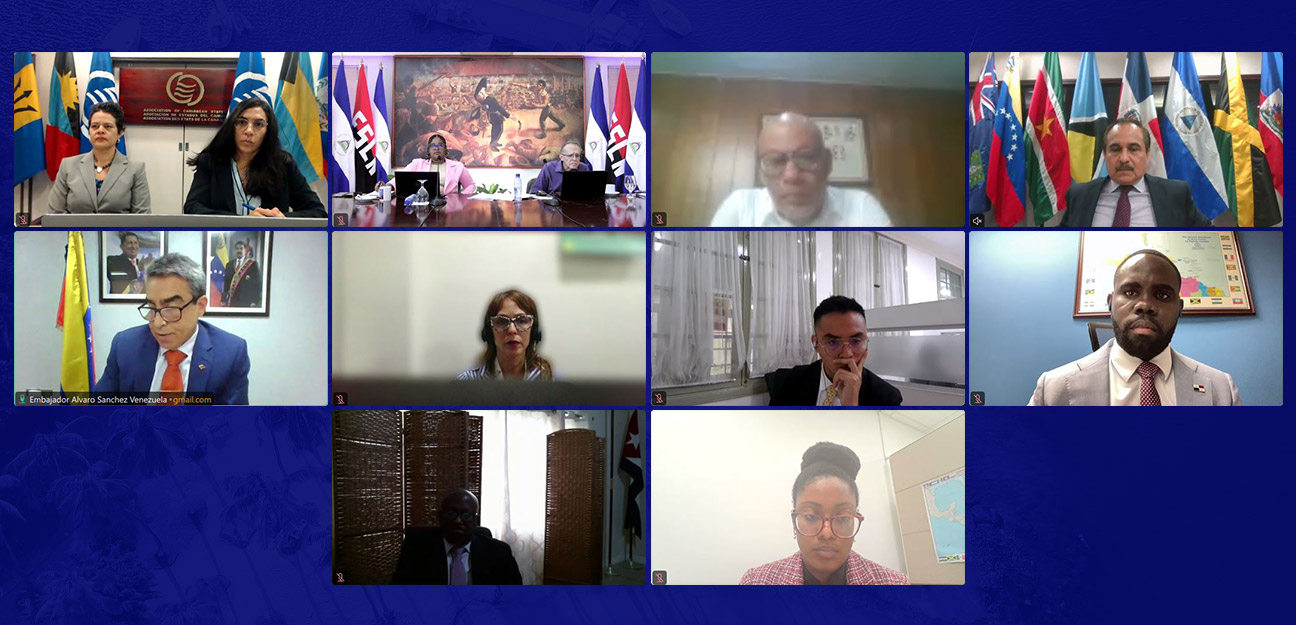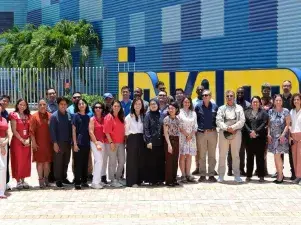ACS advances towards establishing a Sargassum Sub-commission

Port of Spain, Trinidad and Tobago – September 2, 2025.
The Association of Caribbean States (ACS) has taken an important step to protect the Caribbean Sea and the millions who depend on it. At the 3rd Extraordinary Meeting of the Caribbean Sea Commission (CSC), held virtually on August 29, 2025, thirteen Member States and one Associate Member formally approved the Terms of Reference for the creation of a Sargassum Sub-commission, strengthening the region’s collective capacity to respond to this growing challenge.
In his capacity as Chair of the CSC, Mr. Jesús Guerra Bell of the Ministry of Science, Technology and Environment of Cuba, highlighted the growing threats confronting the Caribbean Sea—from climate change and biodiversity loss to marine pollution and the unprecedented sargassum influxes. He welcomed the approval of the Sub-commission’s Terms of Reference as a critical milestone toward stronger regional coordination and international cooperation.
In her remarks, ACS Secretary-General H.E. Noemí Espinoza Madrid, underlined the significance of the CSC as more than just a technical body. “The Caribbean Sea Commission is, in addition to being an important technical body of the Association, a fundamental pillar for ocean governance, a platform that reflects our determination to collectively assume the responsibility of protecting and managing the sea that unites us” she stated.
Secretary-General Espinoza Madrid stressed that advancing toward recognition of the Caribbean Sea as a protected special zone is not only an environmental aspiration but also a a strategic political and developmental imperative —one that could position the region more strongly while improving the lives of millions who depend on the sea for their livelihoods. “Fishers, traders, coastal communities, and future generations depend on us acting with determination today” she affirmed.
The role of the Sub-commission
The forthcoming Sargassum Sub-commission will serve as a bridge between decision-makers and researchers, aligning science, policy, and regional action. Its mission is to transform how the region responds to the seasonal arrival of sargassum—not as a national burden but as a shared regional challenge requiring joint solutions.
The Sub-commission will take a comprehensive approach, focusing on:
- Understanding the extent, severity, and frequency of sargassum influx through scientific monitoring.
- Evaluating the biological and legal status of major sargassum blooms to understand their characteristics and legal implications.
- Assessing the environmental, social, and economic impacts of the blooms to guide effective responses.
- Strengthening forecasting, early detection, and data-sharing across the region.
- Facilitating international cooperation with other countries and organizations facing similar challenges.
- Promoting the exchange of best practices and technologies for safe collection, disposal, and valorisation.
- Mobilizing resources and partnerships to implement joint regional initiatives.
- Developing a regional action plan aligned with the UN Sustainable Development Goals and the Blue Agenda.
Looking ahead
By fostering cooperation, promoting innovation, and keeping communities and ecosystems at the center, the sub-commission is envisioned as a catalyst to turn a regional crisis into an opportunity for resilience, sustainable livelihoods, and stronger Caribbean identity.
The meeting’s exchanges not only captured the urgency of the challenges ahead, but also reflected a shared determination among ACS Members and Associate Members to face them together—marking a decisive step toward safeguarding the Caribbean Sea and the livelihoods it sustains.
About the Association of Caribbean States
The Association of Caribbean States (ACS) is an intergovernmental organization established in 1994 through an international convention, with the aim of promoting consultation, cooperation, and concerted action among the countries of the Greater Caribbean. It currently comprises 25 Member States and 10 Associate Members, and is guided by the principles of multilateralism, respect for sovereignty, and a unity that values the diversity of the Greater Caribbean region.




